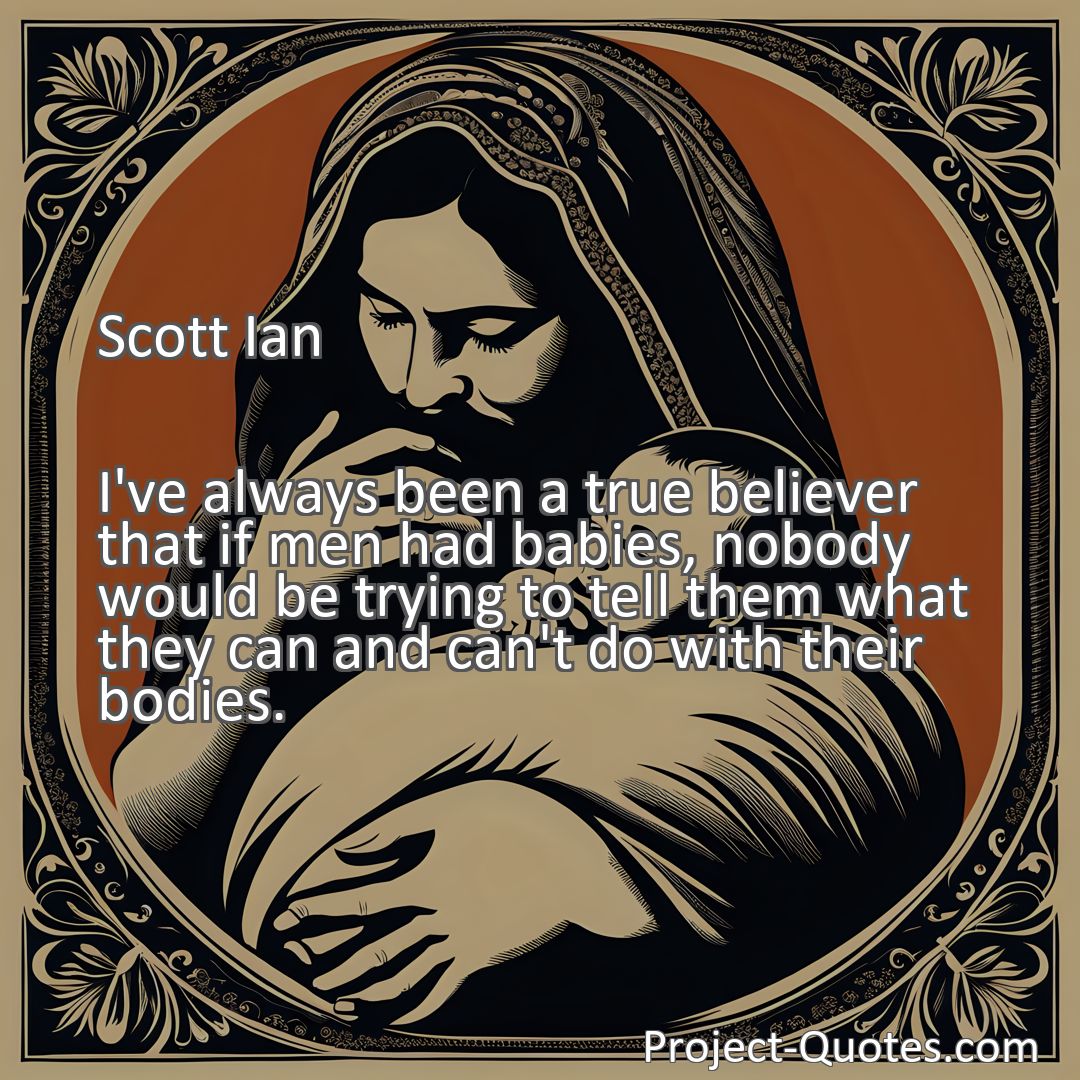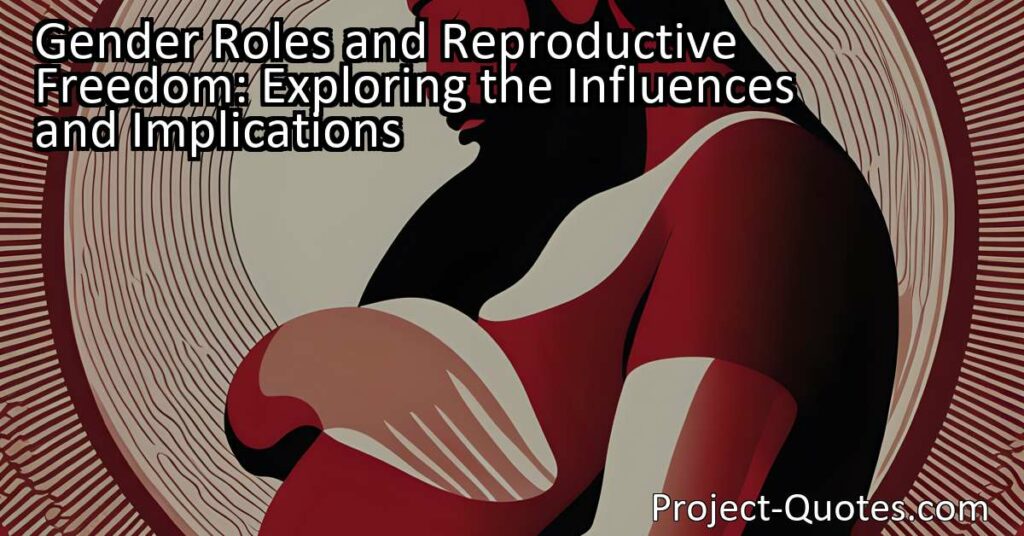I’ve always been a true believer that if men had babies, nobody would be trying to tell them what they can and can’t do with their bodies.
Scott Ian
The essay explores how gender roles significantly influence societal attitudes towards reproductive freedom. It delves into the historical struggle of women for reproductive rights, highlights the different treatment of men’s bodily autonomy, emphasizes the importance of reproductive rights for gender equality, discusses the impact of legislation on reproductive choices, analyzes the role of patriarchal structures, and considers the psychological toll of limited reproductive choices. The conclusion emphasizes the need to challenge biases and prejudices to achieve a society with inclusive reproductive rights for all.
Table of Contents
- 1 I’ve always been a true believer that if men had babies, nobody would be trying to tell them what they can and can’t do with their bodies.
- 2 Scott Ian
- 3 Meaning of Quote – I’ve always been a true believer that if men had babies, nobody would be trying to tell them what they can and can’t do with their bodies.
- 4 Freely Shareable Quote Image
- 5 Related
Meaning of Quote – I’ve always been a true believer that if men had babies, nobody would be trying to tell them what they can and can’t do with their bodies.
Men and Women: Exploring the Importance of Personal Agency in Reproductive Freedom
Introduction:
In his thought-provoking quote, musician Scott Ian puts forth an intriguing notion regarding the issue of reproductive rights. By highlighting the disparity between the treatment of men and women when it comes to choices concerning their bodies, Ian sheds light on the fundamental concept of personal agency. This essay will delve deeper into the implications of Ian’s quote, exploring the idea that gender roles significantly influence societal attitudes towards reproductive freedom.
1. The historical context of women’s reproductive rights:
To comprehend the significance of Ian’s statement, it is essential to consider the historical struggle women have faced in their fight for reproductive freedom. From the suffragettes advocating for the right to vote to landmark court cases like Roe v. Wade, women have fought against societal and legal barriers that have restricted their bodily autonomy for centuries. Examining the history of women’s rights will help us understand why gender plays a pivotal role in shaping attitudes towards reproductive choices.
2. Society’s attitude towards men’s bodily autonomy:
Ian’s quote cleverly suggests that if men were the ones who carried babies, societal attitudes would be significantly different. Historically, men have enjoyed relative autonomy over their bodies, dictating decisions such as whether to engage in combat, participate in sports, or have cosmetic surgery. The comparison between men’s bodily autonomy and the limitations placed on women’s reproductive choices highlights society’s differing expectations based on gender.
3. Reproductive rights as a central component of gender equality:
A crucial aspect of the quote’s underlying message is the connection between reproductive rights and gender equality. By arguing that men would be less restricted if they could become pregnant, Ian emphasizes the unequal power dynamics existing between genders. Addressing these disparities is a crucial step towards achieving true gender equality, highlighting the necessity of robust reproductive rights for all.
4. The impact of legislation on reproductive choices:
Legislation heavily influences one’s autonomy over their reproductive decisions. Throughout history, numerous laws have been enacted that restrict women’s access to contraception and abortion, perpetuating control over their reproductive options stemming from societal attitudes towards women’s bodies. The quote encourages us to reevaluate the value society places on personal agency and explore ways to overcome harmful legislation that impedes reproductive freedom.
5. The role of patriarchal structures in shaping reproductive rights:
At the heart of Ian’s quote lies the impact of patriarchal structures. Patriarchy, which prioritizes male authority and control, has long confined women’s reproductive choices. The mere fact that men are absent from pregnancy experiences but have historically held power over women’s bodies is indicative of a wider systemic issue. Analyzing patriarchy’s influence on societal values reveals the importance of challenging such structures to achieve reproductive freedom.
6. The psychological and emotional toll of limited reproductive choices:
Restrictions on reproductive choices can have severe consequences on an individual’s psychological and emotional well-being. The societal pressure to conform to prescribed gender roles, combined with limited reproductive freedom, can result in feelings of powerlessness, frustration, and even depression. Recognizing the comprehensive impact on an individual’s mental health reinforces the necessity of liberating reproductive rights for all.
Conclusion:
Scott Ian’s astute observation regarding the contrast in societal attitudes towards reproductive choices based on gender provokes an important conversation about personal agency and gender equality. By considering the historical context of women’s rights, societal attitudes towards men’s autonomy, and the impact of legislation and patriarchal structures, we can better understand the underlying issues at play. It is crucial to continue advocating for inclusive reproductive rights that respect and support the personal agency of all individuals, regardless of gender. Only by challenging and dismantling existing biases and prejudices can we achieve a society where everyone has the freedom to make choices about their bodies and their lives.
I hope this quote inspired image brings you hope and peace. Share it with someone who needs it today!


